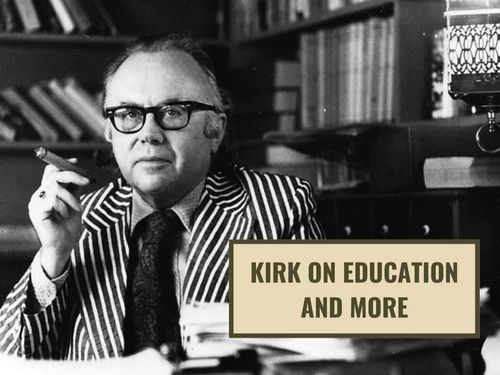Russell Kirk on liberalism, sin and more
Oct 22, 2021 · 2 mins read
0
Share

Russell Kirk was an American writer who traced conservative politics to its philosophical roots. Here are some of his most intriguing ideas on education, sin and how the God of liberalism claims things it can't deliver 👇
Save
Share
Beware of Utopia. Kirk warned against "a society that promises a terrestrial paradise in defiance of the law of limits." The law of limits says we can't have it all. Utopian visions lead people to pick up abhorrent means, and they never reach the heavens they were promised.
Save
Share
Kirk says there are two types of intellects. The first is the "mind of Emerson" - this is the type of personality that enjoys "alteration and tinkering," believes progress is inevitably good, and has an inclination "toward levelling."
Save
Share
The second is the "mind of Hawthorne" - this is the type of person who has reverence for the past, and therefore is skeptical of change for change's sake. "Progress" can be cover for regression. Instead of equality through levelling, it's better to preserve genuine variety.
Save
Share
On family: "A family is more than a simple arrangement for the gratification of sexual impulses and more than a mere housing device." A family can't be reduced to its sexual or economic components alone.
Save
Share
A family, when functional, is a group of individuals with a "common fund of values." Unlike any other institution, a family invokes "spontaneous cooperation and willing sacrifice." Without this cooperation and sacrifice, a state can't function.
Save
Share
The conservative doesn't believe in outsourcing his duties. One's obligations to one's family, neighbors, and local community mustn't be outsourced to indifferent government ministries. Certain burdens are ours to carry, and to be relieved of them would be to lose our identity.
Save
Share
On education: "We need to bring back definite subject matter courses and abolish vague catch alls like social studies." Education should promote intellectual humility and impart a sense of the world's complexity and mystery - and not of man's omnipotence.
Save
Share
The reality of sin. Utopian thinkers in all ages forget to grapple with the question of sin. They picture humans as perfectible, while what we really are is fallible. We can't have a perfect society because imperfection is baked into our nature.
Save
Share
The God of liberalism. Kirk says liberalism has become a "charismatic expression implying prosperity, security, freedom, novelty, and progress." Do liberal policies actually attain these goals? An ideology's claims must be held against the actual fruits it bears.
Save
Share
0